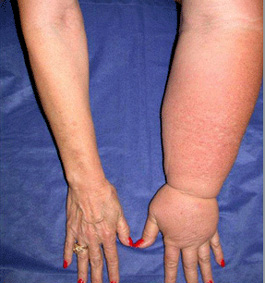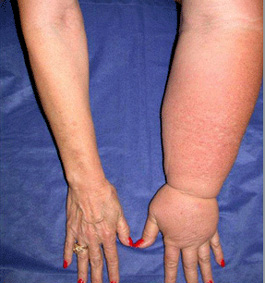Lymphedema is defined as swelling of the extremity due to fluid retention. The lymph system is part of the circulatory system, which consists of arteries, veins, and lymphatic channels. The function of the lymph system is to return fluid back towards the heart, and to purify the blood. It also functions as the body’s antibiotic system, as the lymph channels are mobilized when a potential infection or a trauma occurs to help in the healing process.
 If the lymphatic system is not functioning properly this will lead to swelling, or fluid retention of the extremity. The question is then why does this occur? The most likely causes are family history, also known as primary lymphedema which often presents either at birth or at the onset of puberty (lymphedema praecox), or at later adult life (lymphedema tarda). It may affect both legs, or arms, but very often only one leg or arm is affected. It also may occur as a result of an injury to the lymphatic system, also known as secondary lymphedema, or perhaps as a result of a compressive force on the extremity.
If the lymphatic system is not functioning properly this will lead to swelling, or fluid retention of the extremity. The question is then why does this occur? The most likely causes are family history, also known as primary lymphedema which often presents either at birth or at the onset of puberty (lymphedema praecox), or at later adult life (lymphedema tarda). It may affect both legs, or arms, but very often only one leg or arm is affected. It also may occur as a result of an injury to the lymphatic system, also known as secondary lymphedema, or perhaps as a result of a compressive force on the extremity.
It is often the result of a lymph node dissection during surgery, or as a secondary reaction to radiation therapy. This type of lymphedema may present several years after the initiating event.
Accidents, disease process e.g. cellulitis, or fungi will inhibit the lymphatics system ability to function properly, may overwhelm the main lymphatic channels, and as result the affected extremity will swell.
The symptoms of lymphedema may include swelling (also known as edema), dryness of the skin, tiredness of the extremity, and perhaps skin discoloration. As the process worsens the skin may develop what appears to be “wartlike” skin, and if left untreated the extremity may become deformed into was is referred to as “elephantiasis”.
 If the diagnosis of lymphedema is suspected, early evaluation including a venous duplex ultrasound to differentiate between venous thrombosis, insufficiency, and lymphedema is very important. If the venous duplex ultrasound is normal, then the diagnosis of lymphedema is most likely. Treatment should be recommended for immediate help, and will include leg elevation, and the use ofa surgical compression stocking during daily activities -as in the patients with venous insufficiency. The use of the surgical compression stocking will aid in fluid return, and to stimulate the development of “collateral” (alternate pathways) lymphatic channels. Further workup to assess the possibility of an underlying compression component may be recommended in a case to case basis. Usually, if the process is new in onset, then pelvic ultrasound or CT scan of the abdomen and pelvis would be advisable.
If the diagnosis of lymphedema is suspected, early evaluation including a venous duplex ultrasound to differentiate between venous thrombosis, insufficiency, and lymphedema is very important. If the venous duplex ultrasound is normal, then the diagnosis of lymphedema is most likely. Treatment should be recommended for immediate help, and will include leg elevation, and the use ofa surgical compression stocking during daily activities -as in the patients with venous insufficiency. The use of the surgical compression stocking will aid in fluid return, and to stimulate the development of “collateral” (alternate pathways) lymphatic channels. Further workup to assess the possibility of an underlying compression component may be recommended in a case to case basis. Usually, if the process is new in onset, then pelvic ultrasound or CT scan of the abdomen and pelvis would be advisable.
If the initial use of surgical compression hose is inadequate in the treatment, and if there is no known underlying cause for the lymphedema, then adjunctive measures e.g. Manual lymphatic decompression (MLD), or a lymphedema pump will be of benefit. I will address these adjunctive measures in an upcoming blog.
If you have any questions about Lymphedema, please call NYC’s top varicose vein doctor Dr. Norman Chideckel at 212-993-6133 today.


